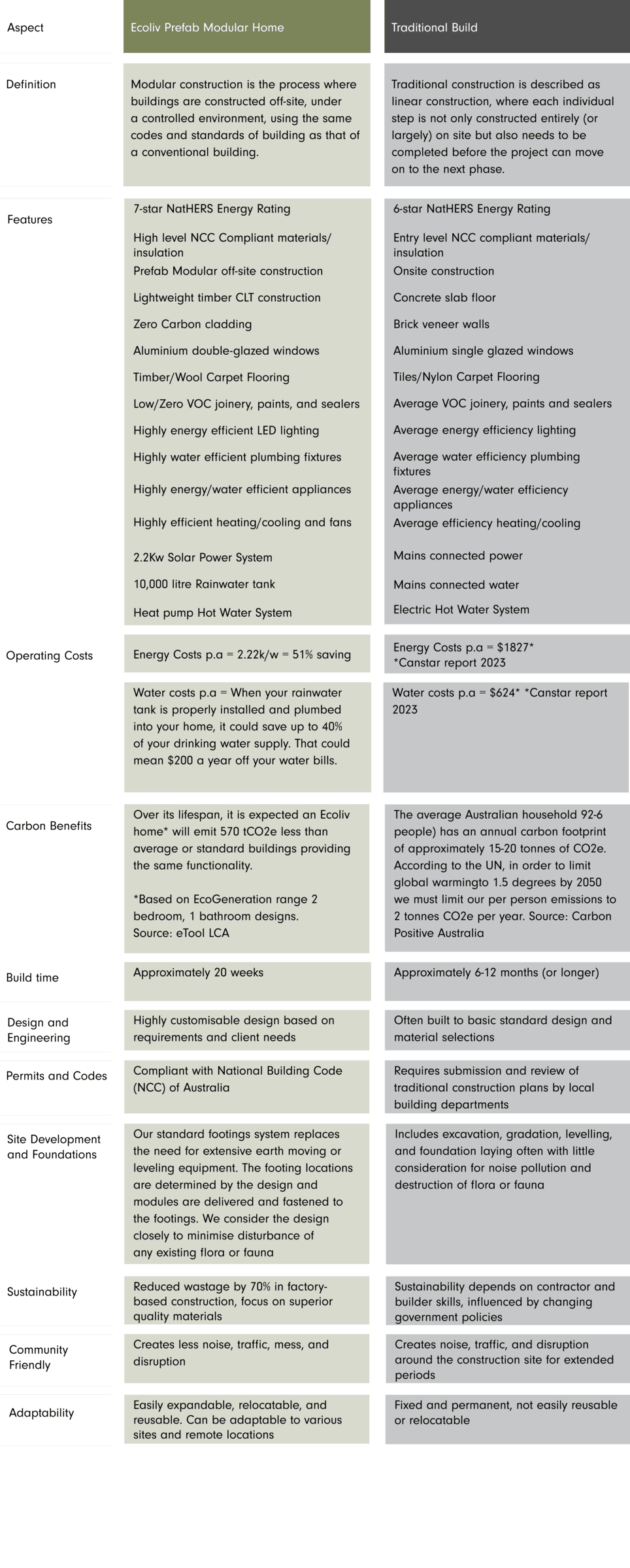Open Mon-Fri 9am-5pm
1114 Bass Hwy, The Gurdies VIC 3984
Phone +61 (03) 5672 5196
Email info@ecoliv.com.au
#Sustainable living #Responsible business
11 October 2023
Prefab construction is rapidly emerging as the way of the future for the Australian Construction Industry, and the push to build prefab is stronger than ever. While traditional construction methods have been widely accepted for many years, factory-built modular construction offers a range of advantages that make it an appealing choice for modern construction projects.
Historically, the perception of prefab buildings has been tainted by the prevalence of cheap and poorly constructed structures found in caravan parks. However, this misconception does not reflect the true potential of modern prefab modular homes. In fact, prefab construction has evolved significantly, embracing cutting-edge technologies and sustainable building practices.
One of the key reasons why prefab is gaining popularity is the industry's need for disruption and a shift towards more sustainable and energy-efficient homes. Traditional volume-built homes often use entry-level materials with high embodied energy, leading to higher carbon footprints and increased environmental impact. In contrast, prefab modular construction allows for more controlled and efficient material usage, reducing waste and minimising embodied carbon in lightweight but resilient building materials.
Furthermore, prefab construction presents several key advantages that is driving its appeal:
Speed of Construction: Prefab homes can be manufactured in a controlled factory environment while site preparation is underway. This parallel construction process significantly reduces the overall construction timeline compared to traditional builds, which are subject to weather delays and sequential on-site work.
Design and Customisation: Modern prefab modular homes offer a wide range of design options and customisation possibilities, challenging the notion that prefab homes lack uniqueness and style. Architects and designers can create innovative, aesthetically pleasing, and functional homes using modular construction techniques.
Energy Efficiency: Prefab homes are designed and orientated to suit each site with a focus on energy efficiency, incorporating high-quality insulation, efficient heating and cooling systems, and energy-efficient fixtures. These features plus incorporating renewable energy sources such as solar panels can lead to reduced operational carbon emissions and lower energy costs over the building's lifetime.
Sustainability: Emphasizing sustainability, prefab modular construction often specifies eco-friendly materials and practices and the controlled factory environment minimises material wastage.
Cost Savings: The streamlined production processes and reduced on-site labour requirements in prefab construction can result in cost savings compared to traditional builds.
As the cost of living continues to rise, the financial benefits of prefab construction become more compelling. Every cent saved during the building process and daily living can significantly impact a homeowner's budget. In addition, operating costs of a spatially energy efficient home can save thousands. And furthermore, the Australian Construction Industry's growing focus on net-zero or carbon-positive homes aligns well with the sustainability goals that prefab construction can achieve.
Let’s take a look at the key differences:

Prefab modular construction is at the forefront of the Australian construction industry's future due to its potential to deliver sustainable, energy-efficient, and cost-effective homes. While the misconception surrounding prefab buildings persists, modern prefab homes offer a plethora of advantages that make them a strong contender in the construction landscape.
A comparison of the key features and carbon benefits of prefab versus traditional builds, as outlined in the table above, can help consumers make informed decisions when choosing the best construction method for their projects and site requirements.
Does modern prefab modular construction align with your sustainability goals to live the dream, naturally?
If you have any further questions reach out to our sales team on 1800 326 548